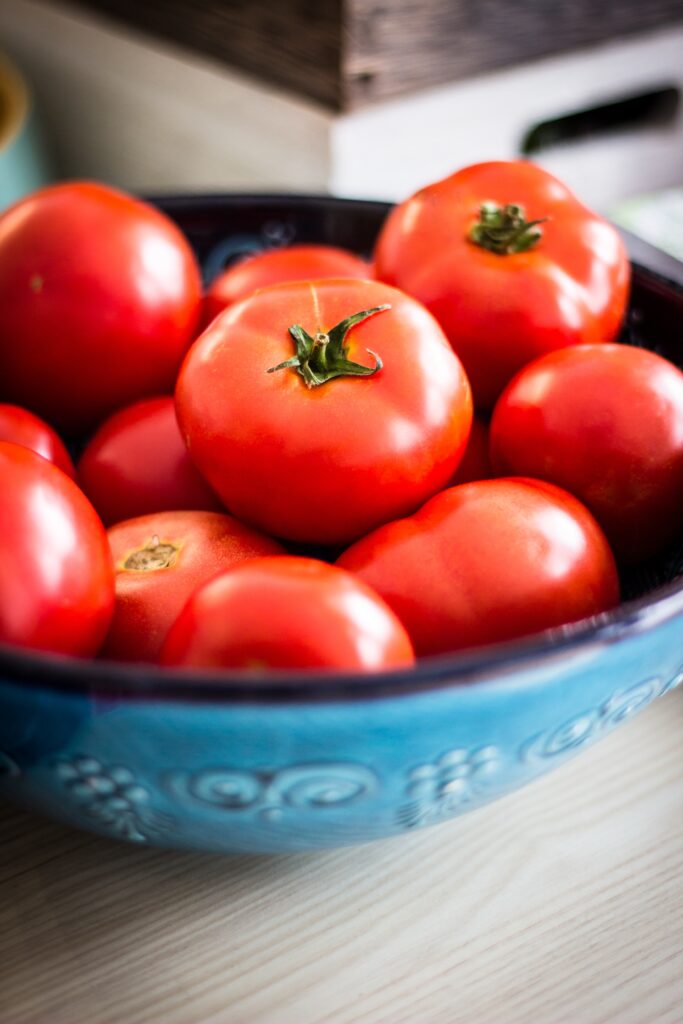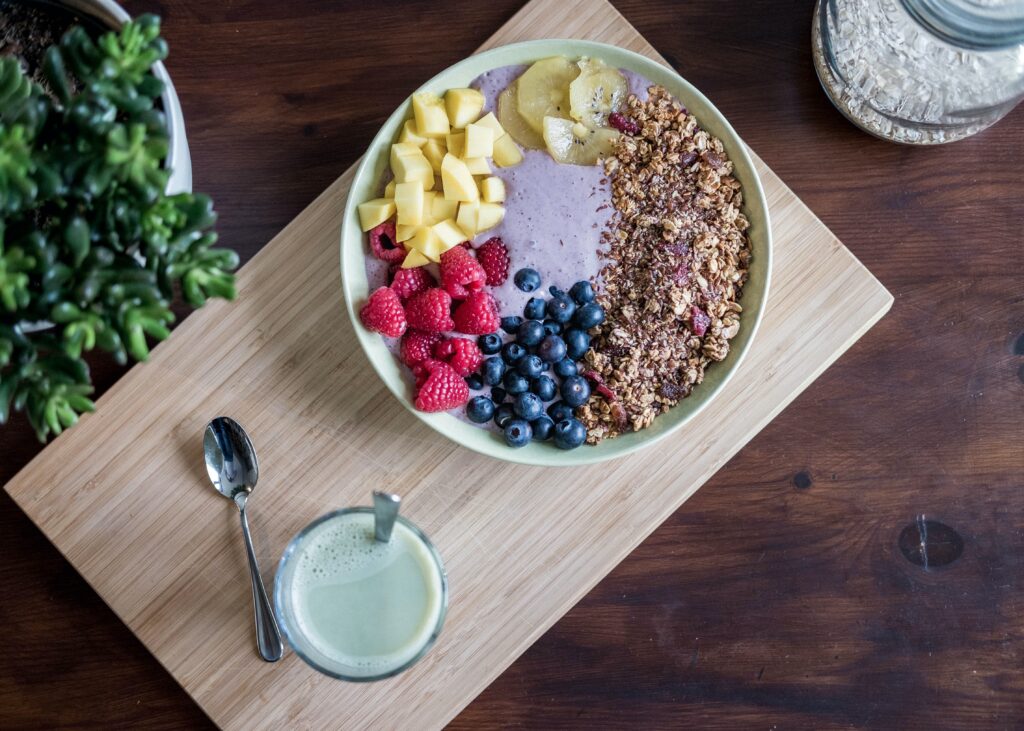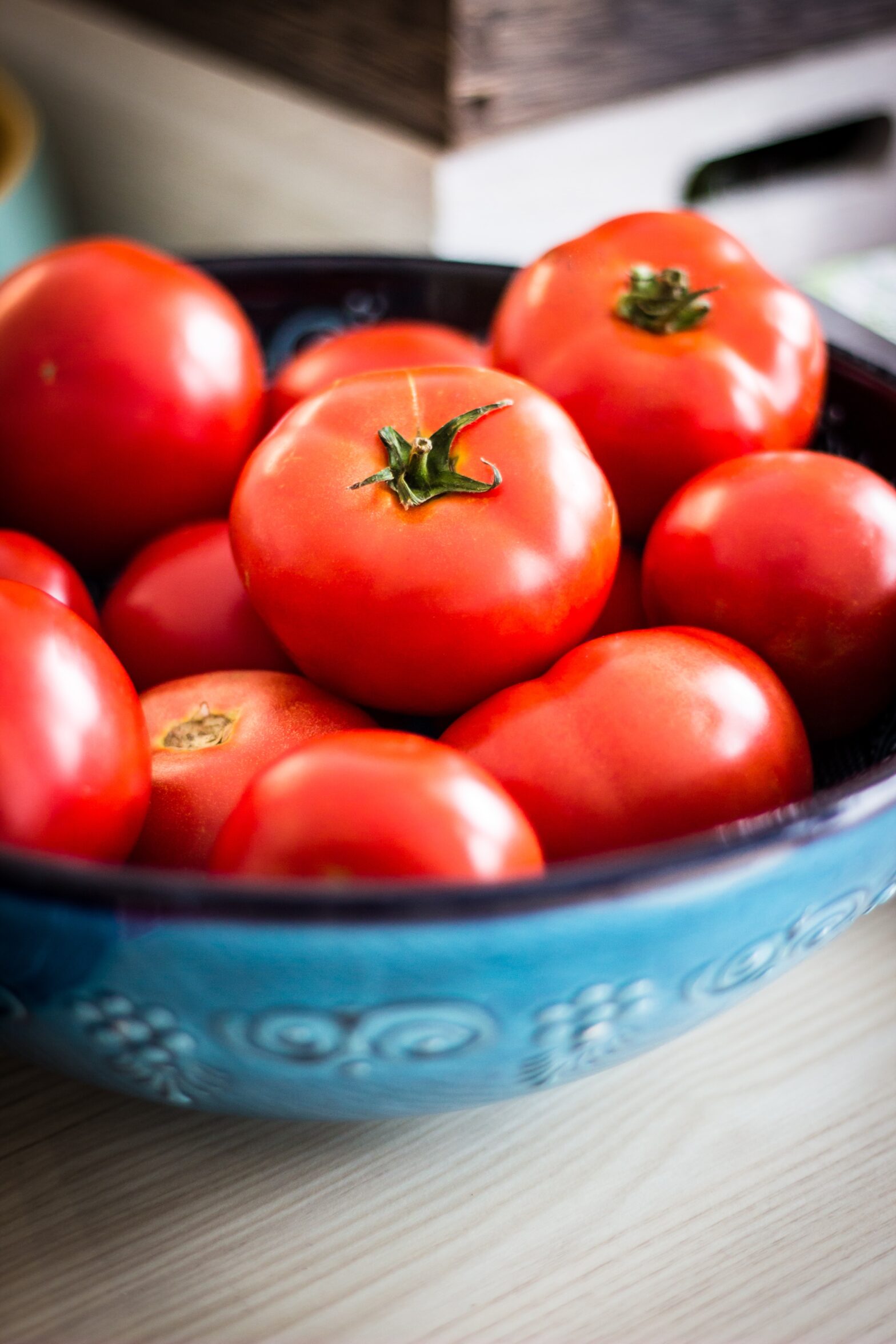Consuming a diet high in ultra-processed foods and added sugar can have detrimental effects on gut health. However, there are various health-promoting foods that can protect and support the gut microbiome. For instance, foods like pistachios, which are rich in fiber, can promote the growth of beneficial gut bacteria. Kefir smoothies, with their probiotics, can improve digestive health and lower inflammation. Avocado toast, high in fiber, can increase bacterial diversity in the gut. Apples with peanut butter offer a satiating snack that provides fiber and healthy fats. Overnight oats, rich in beta-glucan fiber, promote the growth of beneficial gut bacteria. Chia pudding is not only rich in fiber but also contains anti-inflammatory compounds and gut-supportive nutrients. Greek yogurt, with its probiotics and essential nutrients, supports gut health. Berries paired with cottage cheese provide fiber, vitamins, and antioxidants that are beneficial for gut health. Hummus and veggie sticks offer fiber and support regular bowel movements. A green salad with salmon is a fiber-rich option that provides carotenoids and omega-3 fats for gut health. Collagen matcha latte promotes gut barrier health and reduces digestive symptoms. Lastly, dark chocolate-covered strawberries contain both fiber and promote gut bacteria diversity. Lupini beans, high in protein and fiber, can contribute to satiety and the growth of beneficial gut bacteria. These food choices can play a crucial role in maintaining a healthy gut microbiome.

I. Introduction
Maintaining a healthy gut is essential for overall well-being. The gut houses trillions of bacteria that play a crucial role in digestion, nutrient absorption, and immune function. However, modern dietary patterns, characterized by the excessive consumption of ultra-processed foods and added sugars, have a detrimental impact on gut health. On the other hand, incorporating health-promoting foods into one’s diet can protect and support gut health. In this article, we will explore the negative effects of ultra-processed foods on gut health, the role of added sugar in gut health, and highlight a variety of foods that promote gut health.
II. The Impact of Ultra-processed Foods on Gut Health
A. Definition of Ultra-processed Foods
Ultra-processed foods are products that undergo significant industrial processing, often containing a combination of additives, preservatives, and artificial ingredients. These foods, such as packaged snacks, sugary cereals, and fast food, are typically high in unhealthy fats, refined sugars, and sodium, while lacking essential nutrients. Their consumption has surged in recent years due to convenience and affordability.
B. Negative Effects on Gut Health
Research has shown that eating patterns high in ultra-processed foods can have a detrimental impact on gut health. These foods are often low in fiber, which is essential for maintaining a healthy digestive system. Fiber acts as a prebiotic, serving as fuel for beneficial gut bacteria and promoting their growth. Without sufficient fiber intake, the balance of gut bacteria can be disrupted, leading to gastrointestinal issues, inflammation, and even chronic diseases like obesity.
Additionally, ultra-processed foods are typically high in added sugars, which have been linked to a variety of negative health outcomes, including gut dysbiosis. High sugar consumption can alter the composition of gut bacteria, favoring the growth of harmful bacteria and reducing the abundance of beneficial bacteria. This imbalance can contribute to digestive disorders, compromised immune function, and increased susceptibility to infections.
C. Role of Added Sugar in Gut Health
Added sugars, including table sugar, syrups, and high-fructose corn syrup, are commonly found in processed foods and beverages. Excessive consumption of added sugars can impair gut health in several ways. Firstly, high sugar intake disrupts the delicate balance of gut bacteria, leading to dysbiosis and increased intestinal permeability. This can contribute to a state of chronic inflammation, which has been linked to various gastrointestinal disorders.
Moreover, added sugars are rapidly absorbed in the small intestine, causing fluctuations in blood sugar levels and promoting the growth of harmful bacteria that thrive on sugar. These bacteria can produce toxic byproducts, further contributing to intestinal inflammation. Additionally, the fermentation of sugar by gut bacteria can produce excess gas, leading to bloating, discomfort, and other digestive issues.

III. Health-promoting Foods for Gut Health
A. Pistachios
Pistachios are not only a delicious and satisfying snack but also a great choice for promoting gut health. These nuts are rich in fiber, providing around 3 grams per 1-ounce serving. Fiber is essential for maintaining regular bowel movements and promoting the growth of beneficial gut bacteria. Additionally, pistachios contain antioxidants and polyphenols that have been shown to support a healthy gut microbiome.
B. Kefir Smoothies
Kefir, a fermented dairy product, is an excellent source of probiotics, which are beneficial bacteria that support digestive health. Probiotics help maintain a balanced gut microbiome, regulate bowel movements, and reduce inflammation in the gut. Adding kefir to smoothies not only enhances their flavor and texture but also provides a powerful boost of probiotics for gut health.
C. Avocado Toast
Avocado toast has gained popularity as a nutritious and delicious breakfast or snack option, and it also offers benefits for gut health. Avocados are rich in fiber, providing approximately 10 grams per medium-sized fruit. This high fiber content promotes satiety, regulates bowel movements, and increases bacterial diversity in the gut. Additionally, avocados are a good source of monounsaturated fats, which are beneficial for the gut and overall heart health.
D. Apples with Peanut Butter
Apples paired with peanut butter make for a satisfying and nutritious snack that supports gut health. Apples are a great source of fiber, especially when consumed with the skin. The fiber in apples promotes regular bowel movements and feeds the beneficial bacteria in the gut. Peanut butter, on the other hand, provides healthy fats and protein, making the snack more satiating and beneficial for overall gut health.
E. Overnight Oats
Overnight oats have become a popular breakfast option for their convenience and health benefits, including their positive impact on gut health. Oats are rich in beta-glucan fiber, which has been shown to stimulate the growth of beneficial gut bacteria. This fiber also helps regulate bowel movements and supports a healthy digestive system. By preparing the oats overnight with your choice of milk and toppings, you can create a delicious and gut-friendly breakfast.
F. Chia Pudding
Chia seeds are a nutrient-dense superfood that can provide numerous benefits for gut health. These tiny seeds are packed with fiber, omega-3 fatty acids, and antioxidants. The fiber in chia seeds acts as a prebiotic, nourishing the beneficial gut bacteria and promoting their growth. They also contain anti-inflammatory compounds that can help reduce gut inflammation and support a healthy digestive system. Enjoy chia pudding as a tasty and gut-supportive dessert or snack.
G. Greek Yogurt
Greek yogurt is not only a delicious and creamy treat but also a fantastic food for promoting gut health. It is rich in probiotics, specifically strains of beneficial bacteria like Lactobacillus and Bifidobacterium. These probiotics help maintain a healthy gut microbiome, support digestion, and strengthen the immune system. Greek yogurt is also an excellent source of protein, calcium, and other essential nutrients for overall gut health.
H. Berries with Cottage Cheese
Berries paired with cottage cheese make for a refreshing and nutritious snack that is beneficial for gut health. Berries, such as strawberries, blueberries, and raspberries, are packed with fiber, vitamins, and antioxidants. The fiber content promotes regular bowel movements and feeds the beneficial gut bacteria. Cottage cheese, on the other hand, provides protein and probiotics, further supporting gut health.
I. Hummus and Veggie Sticks
Hummus, a tasty and versatile spread made from chickpeas, is not only delicious but also offers gut health benefits. Chickpeas are a great source of fiber, which supports regular bowel movements and feeds the healthy gut bacteria. Hummus also contains tahini, which is made from sesame seeds and provides healthy fats and additional fiber. Enjoy hummus with an array of vegetable sticks, such as carrots, cucumbers, and bell peppers, for a gut-friendly snack option.
J. Green Salad with Salmon
A green salad topped with salmon not only makes for a nutritious and satisfying meal but also offers numerous benefits for gut health. Leafy greens, such as spinach and kale, are rich in fiber and carotenoids, which have been shown to support a healthy gut microbiome. Salmon, a fatty fish, is an excellent source of omega-3 fatty acids, which help reduce gut inflammation and promote a healthy digestive system. Combined, these ingredients create a gut-friendly dish that is both flavorful and nourishing.
K. Collagen Matcha Latte
Collagen matcha lattes have gained popularity for their potential benefits for gut health. Collagen is a protein that supports gut barrier health, enhancing the protective lining of the digestive tract. Matcha, a powdered form of green tea, provides antioxidants and anti-inflammatory compounds that can reduce digestive symptoms and support gut health. By combining collagen powder and matcha with your choice of milk, you can enjoy a delicious and gut-supportive beverage.
L. Dark Chocolate-covered Strawberries
For those with a sweet tooth, dark chocolate-covered strawberries offer a guilt-free treat that promotes gut health. Dark chocolate contains fiber and polyphenols, which act as prebiotics and support the growth of beneficial gut bacteria. Strawberries are also a good source of fiber and antioxidants. When paired together, this combination provides a decadent and gut-friendly dessert option.
M. Lupini Beans
Lupini beans, a legume rich in protein and fiber, are an excellent addition to a gut-healthy diet. Protein and fiber promote satiety, support regular bowel movements, and provide fuel for beneficial gut bacteria. Lupini beans are also low in digestible carbohydrates, making them suitable for those following a low-carb or ketogenic diet. Enjoy them as a snack, add them to salads, or incorporate them into various dishes for gut-supportive nutrition.
IV. Conclusion
Maintaining a healthy gut is essential for overall well-being, and it starts with the diet we choose. Avoiding ultra-processed foods and added sugars is crucial for gut health, as these can lead to dysbiosis, inflammation, and a compromised immune system. Instead, incorporating health-promoting foods into one’s diet can protect and support a healthy gut. Foods such as pistachios, kefir smoothies, avocado toast, apples with peanut butter, overnight oats, chia pudding, Greek yogurt, berries with cottage cheese, hummus and veggie sticks, green salad with salmon, collagen matcha latte, dark chocolate-covered strawberries, and lupini beans offer a variety of options for improving gut health. By making mindful dietary choices, it is possible to nourish and support a thriving gut microbiome, leading to improved digestion, better nutrient absorption, and enhanced overall health.

